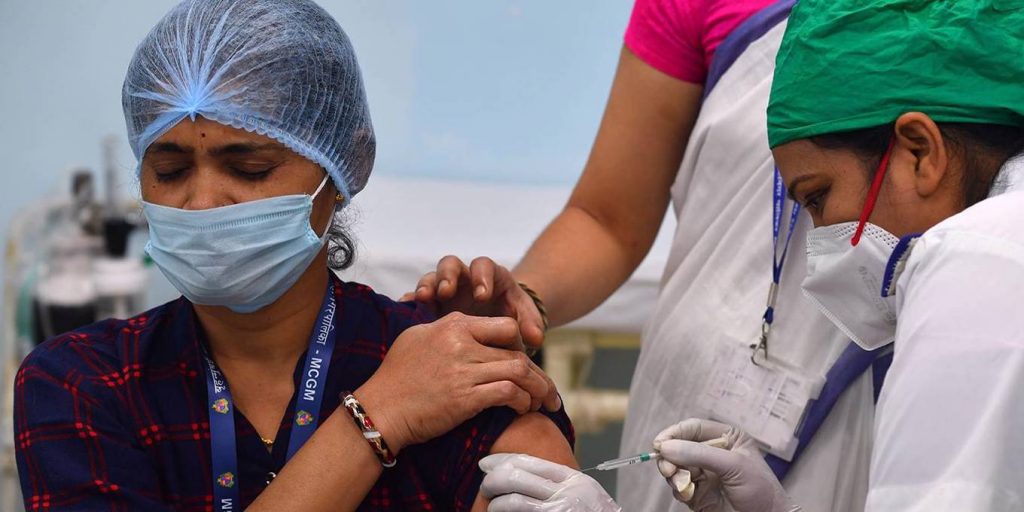Palitha Abeykoon, Maha El Rabbat & David Nabarro
As special envoys on COVID-19 for the director-general of the World Health Organization, we have witnessed firsthand the intensity of the suffering caused by the pandemic, especially in poorer communities. This profound tragedy has been evolving before our eyes and still is nowhere near its end.
In our experience, the first priority in responding to an infectious disease is to save lives and protect the health and well-being of current and future generations. At the same time, we are increasingly concerned by the tremendous social and economic damage that COVID-19 has wrought. With people everywhere struggling to preserve their livelihoods under the constant threat of the coronavirus, it has become clear that this pandemic is more than a health emergency. It has become a global whole-of-society crisis.
In this context, one of our greatest fears is that after decades of improvement, future generations’ prospects have suddenly plummeted. Some regions are experiencing a reversal of gains achieved in the past 20 years. Achievements such as higher employment, expanded essential services, and better education (particularly for girls) are at risk. So are improvements in infrastructure, water and sanitation, disease control, political stability, and governance institutions.
This loss of momentum toward the international community’s Sustainable Development Goals for 2030 will have far-reaching costs, most of which will be borne by the most vulnerable. Consider the vaccine rollout. Through extraordinary global scientific cooperation, the international community has created an Access to COVID-19 Tools Accelerator (ACT-A) to facilitate the sharing of technology, and the COVID-19 Vaccine Global Access (COVAX) facility to deliver vaccines equitably and efficiently around the world. But while hundreds of millions of vaccine doses have been administered globally, there are deep disparities. In high-income countries, vaccine supplies are sufficient to provide for around one in four people, on average; in low-income countries, this figure drops to one in 500. At this point, it should go without saying that no one will be safe until we have made these cutting-edge technologies available to everyone. The longer we delay, the greater the risk that dangerous new variants will emerge.
SARS-CoV-2, the virus that causes COVID-19, is certainly not the last contagious pathogen that humanity will face. But it could be the last one that inflicts such exorbitant costs. Whether the next pandemic can be prevented is up to us all. Success will depend on commitments from all countries to implement the International Health Regulations, the WHO’s legal framework establishing how they should prepare for and respond to the cross-border transmission of pathogens and other health emergencies.
Beyond following through on these existing measures, world leaders should take six additional steps. First, we must dramatically scale up investment in global preparedness, so that we can spot the next potential pandemic as early as possible. There is now ample evidence of what works well, and we have gained hard-earned experience in getting the necessary systems to function as they should, everywhere. All countries should commit to sharing relevant information rapidly and ensuring its reliability.
Second, we must do more to prevent pathogens from moving to humans from animals and the environment. That means appreciating the risks of crossover transmission and adopting a “One Health” mindset that reflects awareness of biological interdependencies and our shared obligation to protect fragile ecosystems.
Third, we need to ensure that all countries can respond rapidly when the alarm bells start to ring. There is an urgent demand for more investment in local, national, and regional health systems, particularly those that currently lack the capacity for prompt detection and response.
Fourth, public officials need to demonstrate enlightened leadership by committing to, and engaging in, constructive international cooperation, without which the world will always be at risk. As WHO envoys, we are encouraged by the call from 26 heads of state and government, the president of the European Council, and WHO Director-General Tedros Adhanom Ghebreyesus for an international treaty on pandemic preparedness. This effort can provide a solid foundation for high-level coordination between governments. Ideally, it would result in a new compact designed to complement the International Health Regulations and drive a simultaneous upgrade in all national systems that need it.
Fifth, we must intensify international cooperation to develop and deliver the vaccines, diagnostics, and treatments that are necessary for achieving universal health coverage. That means building on initiatives like the ACT-A to establish a permanent forward-looking mechanism for ensuring equitable access to critical health technologies for all who need them.
Lastly, and above all, there is an urgent need to reset the response to this crisis. Everyone needs to recommit to supporting a singular and cohesive strategy that is built on equity and fairness, driven by a single-minded focus to end the pandemic as quickly as possible, and in keeping with the WHO’s mantra: solidarity, science, and solutions.
As special envoys for COVID-19, we will continue to support countries and communities as they confront this crisis. The task now is to prevent and mitigate as much of the damage as we can, which will require concerted action within and across countries to implement the right public-health policies and build capacity wherever it is falling short. Sustaining these efforts will be critical, because it will be many months – even years – before vaccines against current and future variants of the virus are accessible to everyone.
We urge everyone to do their part to help prevent, prepare for, and manage the next outbreak. Above all, we call on today’s leaders to muster the solidarity needed to work together for the common good. What the leaders decide to do now will have implications for everyone living today and tomorrow.
Palitha Abeykoon is a senior adviser at the Sri Lankan Ministry of Health. Maha El Rabbat is a former Minister of Health and Population of Egypt. David Nabarro is a former special adviser to the United Nations Secretary-General on the 2030 Agenda for Sustainable Development and Climate Change. ©Project Syndicate
